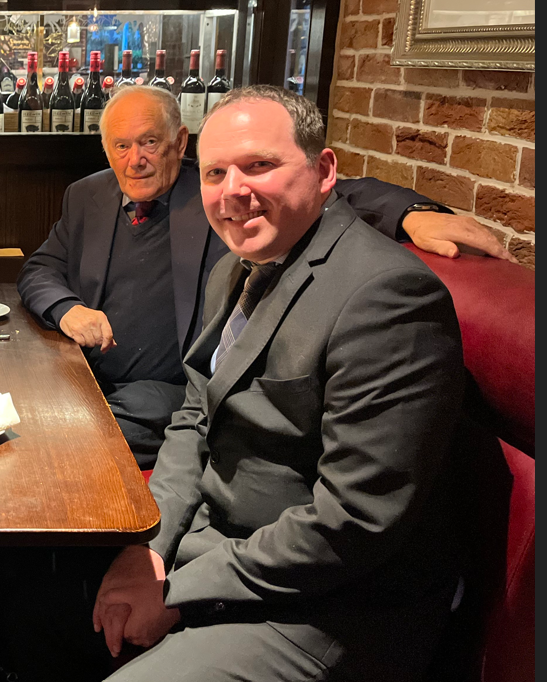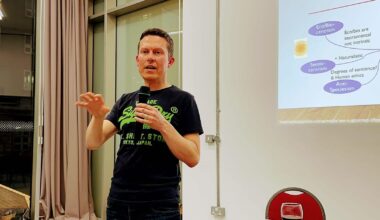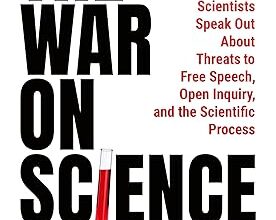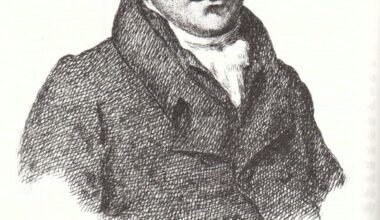
Introduction
Peter Atkins is professor emeritus of physical chemistry at Oxford University. He has made astonishing contributions to chemistry and is well-known for his outspoken advocacy of atheism and freethinking. He is the author of many books, both university textbooks and books for general readers, including The Creation (1981), The Second Law (1984), Creation Revisited (1993), Galileo’s Finger: The Ten Great Ideas of Science (2003), On Being: A Scientist’s Exploration of the Great Questions of Existence (2011), Conjuring the Universe: The Origins of the Laws of Nature (2018), and Concepts in Physical Chemistry (2nd edition, 2024).
A giant in his field and a fierce defender of secularism, he ranks among our era’s strongest proponents of science and secular values. I was fortunate last year to get a few moments with him and ask him a few questions when I helped host a school debate in Aylesbury featuring him against Professor Keith Fox for the show Premier Unbelievable. Below is a transcript of our interview, lightly edited for clarity and concision.
Interview
Samuel McKee: Please tell us about your journey into chemistry.
Peter Atkins: Chemistry was the right mix, I think. At school, physics was too mathematical for me and biology was too embarrassing—it involved a lot of things reproducing, which seemed to me, as a young developing teenager, rather dirty! Chemistry had just the right mix of insight without very serious mathematics. So, it seemed right and indeed I’m glad that is where I landed because, as the well-known saying goes, chemistry is the central science. From my viewpoint, which is more mature now, I can reach out to physics for deeper understanding, and I can reach down to biology for wonderful applications of chemistry. And I am no longer afraid of the mathematics because I can see that it is a language that enables me to open doors. On the whole, the decision I took all those decades ago turned out to be right.
What have been the highlights of your chemistry career and what accomplishments are you most proud of?
I think it is the ability through my textbooks to mould the minds of others, to encourage them to think in the way that I think (for right or wrong). Through writing textbooks, you gain more understanding. There are four stages to understanding. First, when you are a student you pretend to understand. Then, when you are an instructor you think you understand. Then, when you are an author you really have to know you understand because you are out there confronting the world. The fourth stage is when you come to writing new editions of books and textbooks and you realize that you didn’t really understand at all! But it is being a teacher in a very general sense that involves progressively deeper understanding. What I have achieved through being a teacher in this sense is a deepening of my own understanding.
It was a really explosive time in the 1960s and 1970s in chemistry, particularly biochemistry. Could you tell us about your Oxford experiences?
I came to Oxford in 1965 as a lecturer in physical chemistry, later becoming a professor. Being an academic in those days was rather wonderful: never having a boss or being told what to do, never having to scrape around for grant money. And because Oxford had such a big chemistry department, of about 100 faculty, it meant that I could drift away from the mainstream without being too much of an encumbrance on my colleagues. I did enjoy doing the research, which was in quantum mechanics in various forms. I certainly enjoyed that.
I regret that in some ways writing books squeezed out the original research because I had quite a big group of graduate students in the early days. Then the books came along, and I found that I was devoting less time to my graduate students, and it wasn’t fair on their brains to go through their DPhil without serious supervision. So I decided in the 1980s to effectively close down my research and focus on writing increasingly successful textbooks whilst keeping up with my teaching duties in the college. This added to the success of the textbooks because when you are confronted with young minds one on one, two on one, week after week for hours per week, you really see what causes them to think and what causes them perplexity, and where they need help. That translates into better textbooks.
You are a patron of Humanists UK and have been very vocal in discussions around religion. I always thought that even if you weren’t one of the Four Horsemen of New Atheism you were sort of…Horsemen-adjacent, if you like!
I’m a donkey. Or a supportive donkey man.
Being in Oxford I imagine you know Richard Dawkins very well.
Oh yes, very well.
Having been at the forefront of a lot of those discussions around religion, what are your thoughts on that time (the early 2000s) and the rise of New Atheism, and how have you contributed to furthering these discussions?
I am driven by the thought that science is the only way to acquire true understanding, and I find it regrettable that many people don’t think that and argue against it. And so I think one of the reasons I started writing books for the general public was to propagate my own vision and therefore take part in debates and discussions and promote the beauty of scientific understanding. It is a natural extension of writing textbooks—you are exposing people to rational thought.
You can encourage rational thought in all sorts of ways. I think one of the great examples of doing so is [the novel and film] The Martian, because there is this chap stranded on Mars, and everything he does, he sits down and thinks about the most rational way of doing it, the physics, the chemistry, the biology. It is a tour-de-force of rationalism.
Absolutely. And is that one of the best weapons that we can marshal to inspire young people to take science more seriously?
You might think of it like music in the sense that you can lie back and simply enjoy what you are listening to at a superficial or emotional level, just sheer laid-back enjoyment. But then if you want to, you can throw a switch and understand the structure of the music you are listening to, be it classical or popular, and see how it achieves its aim. You don’t need to, but one’s ability to do so deepens one’s delight if you are in the mood. And I think with science, one can look at a rose and take delight in its perfume, its colours, and its form. But again, if you want to you can throw the switch and understand how the genes came into play, what its chemistry is, what causes the colours, what the perfume actually is. I am all in favour of delight, but I am also very much in favour of deepening delight.
I’ll finish on a hopeful note. Looking at our scientific future, what are you hoping for? What are you most excited about for humanity?
The elimination of religion.
[Laughter] Not spacefaring or genetic engineering or anything like that?
[Laughter] No, I think humanity only has a future if religion can be put down.Would you include under that label, as things that need to be eliminated, everything that is not grounded in reason and rationality? Meditation for mental health reasons, even?
Yes, it’s all a complete waste of time. I mean, evolution has led us to this point where we can take both delight in the world and pleasure in our understanding of it. I think it is those two wings that we should be proud of evolution having given us.
So you would agree with Yuval Noah Harari that religion has had some survival value in the past but that now it is no longer necessary?
Yes. It is the opposite of survival now. Religion is a killer now. The only way you can argue with it is with the sword, the bomb, and the bullet.
Related reading
Bringing back the dialectic: interview with Stephen ‘Rationality Rules’ Woodford, by Samuel McKee
‘F*** it, think freely!’ Interview with Brian Cox, by Daniel James Sharp
The Galileo of Pakistan? Interview with Professor Sher Ali, by Ehtesham Hassan
‘We are at a threshold right now’: Lawrence Krauss on science, atheism, religion, and the crisis of ‘wokeism’ in science, by Daniel James Sharp
Consciousness, free will and meaning in a Darwinian universe: interview with Daniel C. Dennett, by Daniel James Sharp
‘An animal is a description of ancient worlds’: interview with Richard Dawkins, by Emma Park








Your email address will not be published. Comments are subject to our Community Guidelines. Required fields are marked *
Donate